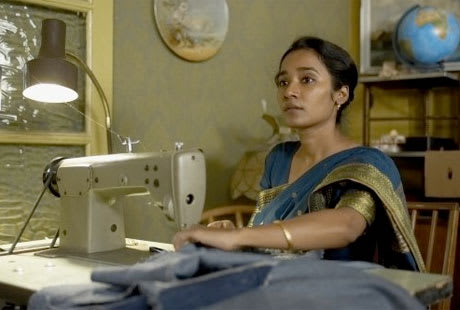Monica Ali's acclaimed novel about a young bride immigrating from a Bangladeshi village to London's East End makes the leap to celluloid and now to DVD in a generous package. Nazneen (Tannishtha Chatterjee) is quiet and obedient to Chanu (Satish Kaushik), her husband through an arranged marriage in the late '80s. More a talker than a doer, Chanu is twice her age and unemployed. Adapting to a foreign land, Nazneen sews in order to support him and their two daughters. As Chanu pressures his daughters to assimilate into English culture, skinheads roam their block of tenements, a situation made worse after the 9/11 attacks when anyone with brown skin is automatically labelled a terrorist. The only joy in Nazneen's life comes from the young man who delivers her the clothes to sew: Karim (Christopher Simpson). He himself becomes radicalized after 9/11 by embracing Islam. Meanwhile, the death of Chanu's newborn son and the dangers of raising their children in England compel Chanu to move his family back to Bangladesh. But do Nazneen and her eldest daughter want to go? Brick Lanespans 13 years and its characters change considerably in that time. Chanu starts off as the predictable villain — the oppressive husband — but grows more complex and sympathetic. Nazneen is less easy to read. She rarely smiles and expresses her excitement over Karim only in letters to her sister. It takes her rebellious eldest daughter to force her to take a stand against Chanu. The problem with the movie is that Nazneen keeps everything locked inside. While a novel can explore the inner world of a character, film is visual. For too much of the film Nazneen looks static and passive. Director Gavon over-employs voiceover to reveal Nazneen to the audience, but this device can get tiresome. There are moments when a glance or a reaction would have spoken a thousand words. The narration smothers an otherwise good film. A lively commentary by Gavron and star Chatterjee reveal all aspects of the production, from adaptation to casting. They also discuss threats from Muslim extremists, which disrupted the shoot and made headlines. The "making of" featurette doesn't offer much, nor do interviews with the stars. However, Gavron's interview is the most interesting, in that she discusses being white and collaborating with her South Asian stars and consulting London's Bangladeshi community to arrive at the emotional truth of Nazneen and the film's cultural details.
(Sony)Brick Lane
Sarah Gavron

BY Allan TongPublished Jan 9, 2009